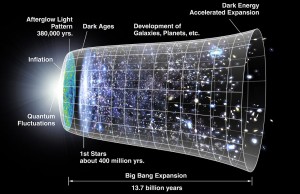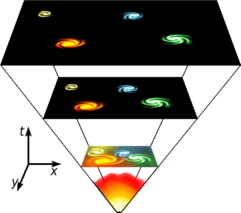 In a detective story or murder trial, sometimes no single piece of evidence, considered in isolation, shows that Jones is guilty. However, when the cumulative weight of all the evidence is taken into account, the verdict becomes clear. In the same way, some of the features of the universe considered might provide much stronger (or weaker) evidence for God than others.
In a detective story or murder trial, sometimes no single piece of evidence, considered in isolation, shows that Jones is guilty. However, when the cumulative weight of all the evidence is taken into account, the verdict becomes clear. In the same way, some of the features of the universe considered might provide much stronger (or weaker) evidence for God than others.
Granted, some evidence – design and morality, for example – seems to provide more than enough evidence for theism even when it is taken in isolation. But there are other clues of God’s existence which should not be overlooked. For example, theism explains why a physical universe exists at all.
1) This principle seems to be presupposed in all inquiry: we should push our explorations as far as possible; we should try to understand as much as we possibly can. A good explanation will have power – it will make our observations seem less surprising; it will also account for the evidence as simply as possible. However, sooner or later we will reach a stopping point. When our explanations no longer enlighten the evidence, when they become more and more complex, when they make the facts seem more mysterious, we will have reached the limits of our understanding. We need a stopping point for our explanations
2) Science also seems to presuppose the following principle: there is some explanation for everything that happens or exists. So scientists examine the world believing that there are explanations for these facts. But if an entire universe can exist without explanation, why should we assume that there is an explanation for every event or object in that universe? Why not assume that many things – be it mass extinctions, the formation of galaxies or the origin of life – just happened without a reason?
 3) So we need to provide an explanation for the existence of the universe. Now, the universe can be described as a system. It is a collection of objects – the basic “stuff” of the universe (for example, particles or fields) which are governed by rules – or laws of nature. These laws tell us all the possible states of a system and how that system can evolve over time from one state into another. Furthermore, the universe contains conscious observers who can observe and comprehend these rules and their objects. So why does this system exist?
3) So we need to provide an explanation for the existence of the universe. Now, the universe can be described as a system. It is a collection of objects – the basic “stuff” of the universe (for example, particles or fields) which are governed by rules – or laws of nature. These laws tell us all the possible states of a system and how that system can evolve over time from one state into another. Furthermore, the universe contains conscious observers who can observe and comprehend these rules and their objects. So why does this system exist?
4) The universe does not adequately explain its own existence. The universe might have been composed of fewer parts or more; it might have been composed of a completely different type of basic stuff. And it might have been governed by different rules or none. It might have been one unchanging particle or a chaotic swirling mess. In fact, it is surprising is that a physical universe exists at all!
5) Science cannot explain why the basic stuff exists or why there are rules that govern its behaviour. In other words, physics cannot tell us why a system exists and why it is governed by laws of nature. In other words, physics cannot tell us why there is something rather than nothing.
 Perhaps we could argue that each state of the universe is explained by the state just prior to that? If scientists explain, one by one, all the physical reactions and transformations that have taken place within the universe won’t they explain why the whole universe exists? And suppose the universe is infinitely old. Each state of the universe will then have a full explanation. Won’t we have an explanation for the existence of the universe at that point?
Perhaps we could argue that each state of the universe is explained by the state just prior to that? If scientists explain, one by one, all the physical reactions and transformations that have taken place within the universe won’t they explain why the whole universe exists? And suppose the universe is infinitely old. Each state of the universe will then have a full explanation. Won’t we have an explanation for the existence of the universe at that point?
Unfortunately, this does not seem to be the case. By explaining each physical transformation and reaction in the universe we don’t answer “why does this system of parts and laws exits at all?” Even if there are infinitely many events, we are still left with the questions – “where did this infinitely long series of events come from? Why does it involve these laws and not others? Why is any of this happening?”
6) The differences between God and the physical universe strongly suggest that God is a suitable terminating point for explaining the existence of our universe.
God is unlimited, personal power: his power and awareness cannot be limited by anything else. Nothing else made God, and everything else that exists depends on him to exist. That is to say, God depends on nothing else for his existence. Nothing can limit God; no force or state of affairs could prevent God’s existence. By contrast, because it is composed of limited parts, the universe appears to be contingent: it must be explained by something beyond itself.
So, if God exists (and most atheists grant that this possibility) there could not be any cause of his existence and so his existence could not be explained by anything outside of himself. By contrast, it seems entirely possible that the universe could have a cause and hence an explanation. Second, if God exists, there could not have been a beginning to his existence, whereas there is good evidence that our universe probably did have a beginning (and it certainly could have had a beginning).
Third, many theists have argued that God is a “maximally great being”; if God exists, he must be as great as it is possible to be. If this is the case, then if God exists his existence is necessary. If God’s existence is necessary he could not have failed to exist. If God is a “Necessary Being” no matter what else is true, then God must exist. It would be impossible for God not to exist! Unlike the universe, God would be explained by his own nature.
